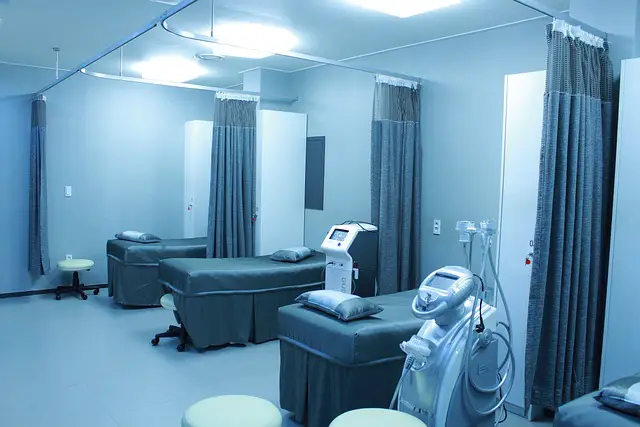Outpatient care allows patients to receive treatment without being admitted to a hospital overnight. Inpatient care involves staying overnight at a hospital or medical facility for more intensive treatment and around-the-clock supervision.
TL;DR Outpatient care Vs. Inpatient care
Outpatient care refers to medical services provided without overnight hospitalization, allowing patients to receive care while maintaining their daily routines. Inpatient care involves overnight stays in a hospital or healthcare facility for intensive treatment and monitoring of severe or complex conditions. Outpatient care offers convenience, cost-effectiveness, reduced infection risk, faster recovery, flexibility, and personalized care. Inpatient care provides intensive medical care, surgical procedures, a multidisciplinary approach, continuous monitoring and support, rehabilitation and recovery services, and emotional and social support. The need for outpatient or inpatient care depends on the specific medical condition and treatment requirements.
What is outpatient care?

Outpatient care refers to medical services and treatments provided to patients who do not require overnight hospitalization. It is a flexible and convenient option that allows individuals to receive necessary medical attention while still maintaining their daily routines.
In an outpatient setting, patients typically visit clinics, doctor’s offices, or specialized healthcare facilities for their appointments. They receive various types of care including consultations, diagnostic tests, minor procedures, therapy sessions, and medication management.
Outpatient care promotes patient autonomy as individuals have greater control over their healthcare decisions and can actively participate in managing their own health. It fosters continuity of care by allowing patients to establish long-term relationships with healthcare providers who become familiar with their specific needs and preferences.
What is inpatient care?

Inpatient care refers to medical treatment that requires the patient to stay overnight or for an extended period in a hospital or healthcare facility. It is provided when a person’s condition is severe, complex, or requires constant monitoring and specialized care.
During inpatient care, patients have access to round-the-clock medical professionals and support staff who are trained to manage critical conditions and emergencies. This type of care often involves surgeries, intensive treatments, mental health services, rehabilitation programs, and long-term stays for chronic illnesses.
In an inpatient setting, patients receive comprehensive care from a multidisciplinary team of doctors, nurses, therapists, and other specialists who work together to develop personalized treatment plans. The focus is on providing continuous monitoring of vital signs and administering necessary medications or therapies.
The environment within an inpatient setting allows for greater collaboration between different healthcare providers involved in the patient’s treatment journey. This can result in better coordination of care and more effective communication among various specialists.
Outpatient care Vs. Inpatient care – Key differences
| Outpatient Care | Inpatient Care | |
|---|---|---|
| Definition | Medical services provided without overnight stay in a healthcare facility | Medical services provided with overnight stay in a healthcare facility |
| Setting | Clinics, doctor's offices, outpatient departments | Hospitals, specialized healthcare facilities |
| Duration | Short duration (few hours to a day) | Longer duration (days to weeks) |
| Admission | No formal admission process required | Formal admission process required |
| Medical Needs | Less severe conditions, routine check-ups, minor surgeries | Severe conditions, major surgeries, complex treatments |
| Intensity of Care | Low intensity care | High intensity care |
| Monitoring | Limited monitoring and follow-up | Constant monitoring and follow-up |
| Nursing Care | Minimal nursing care | Extensive nursing care |
| Cost | Usually less expensive | Usually more expensive |
| Insurance Coverage | Typically covered by health insurance policies | Typically covered by health insurance policies |
| Discharge | Patients can go home after receiving care | Patients are discharged after recovery or transferred to another healthcare facility |
| Example Procedures | Flu shots, physical therapy, routine check-ups | Major surgeries, childbirth, cancer treatments |
The benefits of outpatient care
- Convenience: Outpatient care provides convenience to patients as it does not require an overnight stay in a healthcare facility. Patients can receive medical services and treatments without disrupting their daily routines or responsibilities. They can schedule appointments at their convenience and return home after receiving care.
- Cost-effective: Outpatient care is generally less expensive compared to inpatient care. Since there is no need for overnight accommodations or extensive nursing care, the associated costs are lower. This can be especially beneficial for individuals without comprehensive health insurance coverage or those seeking more affordable healthcare options.
- Reduced infection risk: By avoiding overnight stays in a healthcare facility, patients are exposed to a lower risk of hospital-acquired infections. Hospitals can be a breeding ground for infectious diseases, and outpatient care minimizes the duration of exposure, reducing the chances of contracting infections.
- Faster recovery: Outpatient care often focuses on treating less severe conditions or providing routine check-ups. With early detection and prompt treatment, patients have the opportunity for faster recovery and better overall health outcomes. Being able to return to the comfort of their homes can also contribute to a sense of well-being and aid in the recovery process.
- Flexibility and accessibility: Outpatient care is typically provided in various settings such as clinics, doctor’s offices, or outpatient departments, making it easily accessible to patients. This availability allows individuals to seek medical attention for a wide range of conditions promptly. Additionally, outpatient care often offers flexible appointment scheduling, accommodating the needs of patients with busy schedules.
- Personalized care: In outpatient settings, healthcare providers often have more time to spend with individual patients, allowing for a more personalized approach to care. The healthcare team can focus on understanding the patient’s specific needs, providing tailored treatment plans, and offering education and guidance on managing their health.
The benefits of inpatient care
- Intensive Medical Care: Inpatient care is suitable for patients with severe or complex medical conditions that require a high level of monitoring, specialized treatment, and around-the-clock care. In a hospital setting, healthcare professionals can closely monitor patients’ conditions, administer medication promptly, and respond rapidly to any complications or emergencies that may arise.
- Surgical Procedures: Inpatient care is often necessary for surgical procedures that require general anesthesia or complex interventions. In a hospital, patients have access to operating rooms, specialized surgical equipment, and post-operative recovery units. They can receive comprehensive pre-operative evaluations, immediate surgical interventions, and post-operative care to ensure a smooth and safe recovery.
- Multidisciplinary Approach: Inpatient care facilitates a multidisciplinary approach to healthcare. Patients benefit from the expertise of various healthcare professionals, including physicians, surgeons, nurses, specialists, therapists, and support staff. This collaborative approach allows for comprehensive evaluations, coordinated treatments, and efficient communication among the healthcare team, leading to better outcomes.
- Continuous Monitoring and Support: Inpatient care provides continuous monitoring of vital signs, regular medical assessments, and immediate access to medical assistance. Patients can be closely monitored for any changes in their condition, enabling early detection of complications and timely interventions. Moreover, inpatient care offers access to specialized diagnostic tools and medical technologies that may not be available in outpatient settings.
- Rehabilitation and Recovery: For patients requiring extensive rehabilitation or long-term recovery, inpatient care offers comprehensive rehabilitation services. This includes physical therapy, occupational therapy, speech therapy, and other specialized rehabilitation programs. Patients can receive intensive therapy sessions, consistent monitoring of progress, and a supportive environment conducive to recovery.
- Emotional and Social Support: Inpatient care can provide emotional and social support to patients and their families. The presence of healthcare professionals, support groups, counselors, and other patients facing similar conditions can offer emotional reassurance, education, and a sense of community. In addition, families can stay close to their loved ones during the hospitalization period, providing comfort and involvement in the care process.
When is outpatient care needed?
Outpatient care is needed when you need medical attention but do not require hospitalization. This can include a variety of services, such as:
- Diagnostic tests, such as blood tests, X-rays, and ultrasounds
- Treatment for minor injuries or illnesses, such as colds, flu, and ear infections
- Minor surgeries, such as mole removal and laser eye surgery
- Ongoing treatment for chronic conditions, such as diabetes and hypertension
- Rehabilitation services, such as physical therapy and occupational therapy
Outpatient care can be provided in a variety of settings, including:
- Your doctor’s office
- A walk-in clinic
- An urgent care center
- A specialized outpatient clinic
- A hospital outpatient department
The decision of whether to receive outpatient care or inpatient care is made on a case-by-case basis. Factors that may be considered include the severity of your illness or injury, your overall health status, and your personal preferences.
Here are some examples of when outpatient care might be needed:
- You have a cold or the flu and need to be seen by a doctor, but you do not need to be admitted to the hospital.
- You have a minor injury, such as a cut or a sprain, that does not require stitches or surgery.
- You need to have a diagnostic test, such as an X-ray or an ultrasound.
You are starting treatment for a chronic condition, such as diabetes or hypertension. - You need rehabilitation services, such as physical therapy or occupational therapy.
If you are unsure whether you need outpatient care or inpatient care, talk to your doctor. They can help you make the best decision for your individual situation.
When is inpatient care needed?
Inpatient care is needed when you require constant medical attention and monitoring. This can include a variety of conditions, such as:
- Serious illnesses or injuries. This includes conditions that are life-threatening or that require intensive care. For example, you may need inpatient care if you have a heart attack, stroke, or major surgery.
- Chronic conditions that require specialized treatment. This includes conditions that are difficult to manage at home or that require regular monitoring. For example, you may need inpatient care if you have diabetes, COPD, or cancer.
- Mental health conditions. Inpatient care can be helpful for people with severe mental health conditions, such as psychosis or suicidality. This type of care can provide a safe and supportive environment where people can receive the treatment they need.
- Addiction treatment. Inpatient care can be an effective way to treat addiction. This type of care provides a safe and supportive environment where people can detox from drugs or alcohol and receive the treatment they need to stay sober.
The decision of whether to receive inpatient care is made on a case-by-case basis. Factors that may be considered include the severity of your illness or condition, your overall health status, and your personal preferences.
Here are some examples of when inpatient care might be needed:
- You have a serious illness or injury that requires constant medical attention and monitoring.
- You have a chronic condition that is difficult to manage at home or that requires regular monitoring.
- You are experiencing a mental health crisis and need a safe and supportive environment.
- You are struggling with addiction and need treatment in a structured environment.
If you are unsure whether you need inpatient care, talk to your doctor. They can help you make the best decision for your individual situation.
Image Credits
Featured Image By – Photo by Pixabay
Image 1 By – mrsiraphol on Freepik
Image 2 By – sungmin cho from Pixabay








